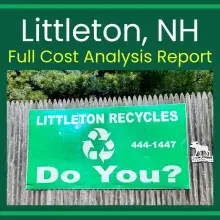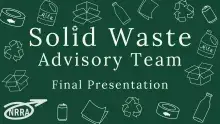Full Cost Accounting (FCA) is a systematic approach for identifying, summing, and reporting the actual costs of solid waste management in a town or community.
FCA can be a new way of thinking about Municipal Solid Waste (MSW) for some communities, or an extension of current management practices for others.
Full Cost Accounting can help residents and decision makers better understand the benefits of recycling or why changes to the town's solid waste program are necessary.
In this Full Cost Accounting Toolkit, you will find the basics for FCA in a video (coming soon!) and a downloadable resource, several resources for operators, and case studies.
Need help or have a question? Reach out to our Member Services team by email or by calling: 603-736-4401
Full cost accounting excel workbook
Key Takeaway: Full Cost Accounting can help towns educate residents, make data-driven decisions and program changes, and can be used for financial planning, fee and rate setting, and vendor negotiations.
THE WHAT & WHY OF FULL COST ACCOUNTING
By creating a Full Cost Accounting model and accounting for everything, including MSW, recycling, composting, labor wages and benefits, disposal costs, administration costs, and utilities, a facility or town can determine what changes may need to be made to support the town's solid waste program.
FCA focuses on three major types of costs: up-front costs, operating costs, and back-end costs. When creating a FCA model, there are several inputs that help determine these three types of costs, including:
- Annual Facility Report
- Expenditure Reports
- Capital Asset List
- Capital Improvement Plan
- Revenue Reports
- Municipal Annual Report
Once a Full Cost Accounting model is complete, it will show three main outputs:
- Net unit cost for your recycling, landfill, compost, or waste-to-energy program
- Pie charts of cost breakdowns of your program
- The average waste generation per person
These reports are used to complete the Full Cost Accounting Workbook, to create a town-specific model. The Workbook has six main forms:
- Labor (wages & benefits)
- Operation and maintenance
- Depreciation of capital items
- Amortized future costs
- Indirect and Administrative costs
- Final summary
While initially setting up a Full Cost Accounting model for your town can take time, once it is complete, it is easy to update over time to look for areas of inefficiency and smooth out the peaks and valleys of expenses over time.
From the EPA:
While FCA is consistent with generally accepted accounting principles, it serves different goals and audiences than traditional government accounting reports. FCA is not the same as cash flow or general fund accounting, as it focuses on the flow of economic resources (assets) and recognizes costs as resources are used or committed, regardless of when money is spent. Because solid waste management can entail significant expenditures both before and after the operating life of management facilities, focusing solely on the use of current financial resources misrepresents the costs of MSW management and can be misleading.
From the New Jersey Department of Environmental Protection:
The U.S. Environmental Protection Agency has been promoting a move to full cost accounting because many publicly funded solid waste programs have been unintentionally underpricing their services. Their accounting systems did not reflect the full costs of providing solid waste management services. That means that recycling coordinators, solid waste planners, public works officials, custodians and even elected officials are being asked to learn the language and tools of accounting, so they can make more informed solid waste management decisions.
RESOURCES
PRESENTATIONS
- Follow the Money! Full Cost Accounting for Solid Waste Management: This joint presentation between NRRA and NHDES covers the benefits and logistics of creating a FCA model, including how to allocate direct costs and how to work out tricky inputs.
- Save Money on Solid Waste: Understanding Full Costs and Funding Sources: This joint presentation between the Connecticut Department of Energy and Environmental Protection (CT DEEP) and the EPA Region 1 was designed to help public officials and solid waste program managers understand full cost accounting and hot to set equitable fees for solid waste services.
HANDS-ON RESOURCES
- Full Cost Accounting for Municipal Solid Waste Management: A Handbook: This is the ultimate FCA handbook, created by the EPA is designed to help municipalities implement FCA within their community, including better understanding the costs of municipal solid waste (MSW) services, answer questions about FCA, and guide towns through the implementation process.
- Questions and Answers About Full Cost Accounting: This downloadable booklet was created by the EPA and covers the most common questions about FCA including, getting started, implementing, benefits, rate setting, recycling, privatization, and costs of FCA.
- Making Solid (Waste) Decisions with Full Cost Accounting: This downloadable booklet created by the EPA shows how municipalities can make informed decisions using their Full Cost Accounting model.
- Benefits of Full Cost Accounting: This EPA webpage clearly outlines the many benefits of developing a FCA, which include:
- Identify the costs of MSW management
- See through the peaks and valleys in MSW cash expenditures
- Explain MSW costs to residents more clearly
- Adopt a businesslike approach to MSW management
- Develop a stronger position in negotiating with vendors
- Evaluate the appropriate mix of MSW services
- Fine-tune MSW programs
- Fully Understanding Costs: This handbook from the New Jersey DEP cover four main sections: (1) The weird world of costs (2) Full cost accounting (3) Cost benchmarks and (4) The route audit: The numbers you need to reduce costs.
- Full Cost Accounting Worksheet and an Example of Completed Full Cost Accounting Worksheet (thanks to Lancaster, NH). After reviewing the presentations above, you may be ready to try creating a Full Cost Accounting model of your own. Linked above are a downloadable excel workbook (with multiple sheets), as well as Lancaster, NH's example of their completed model.
CASE STUDIES
NRRA RESOURCES
The following resources have been created by NRRA in regards to Full Cost Accounting. This is a dynamic and up-to-date listing of all Full Cost Accounting-related resources.





